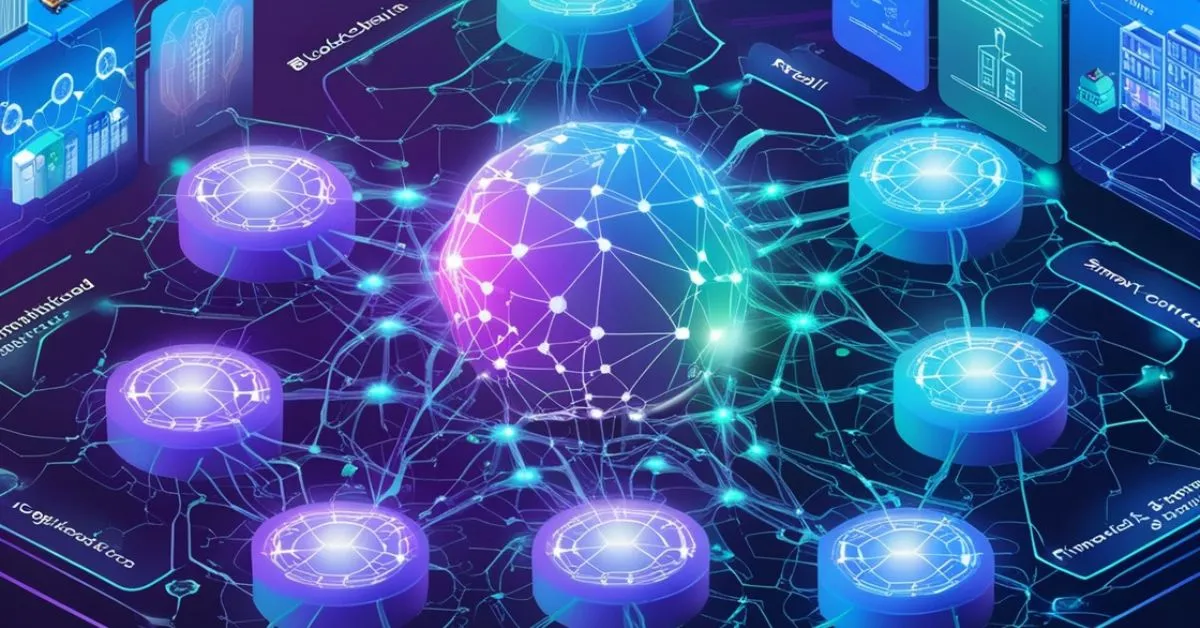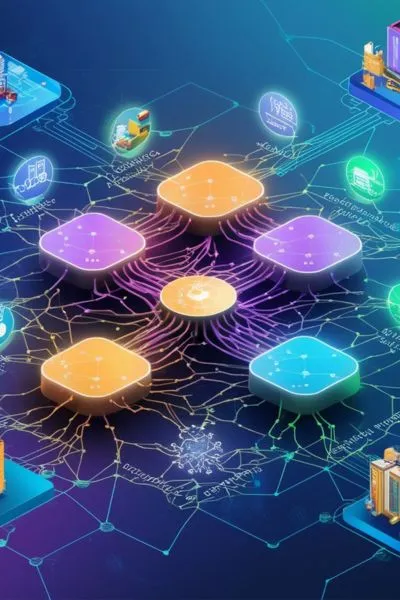Best Exploring the Future of Blockchain and AI in Web 3.0
|
Best Blockchain AI Tools (pillar blog) Related Blog |
|
1.How Blockchain and AI Integration is Revolutionizing Technology |
|
2.Top Blockchain-Powered AI Platforms to Watch in 2025 |
|
3.How AI Tools for Enhancing Blockchain Security |
|
4.How Machine Learning is Solving Blockchain Scalability Issues |
|
5.How AI Tools Transforming Cryptocurrency Trading |
|
6.Best Blockchain and AI in Supply Chain Optimization |
|
7.How Blockchain AI Tools Are Disrupting Healthcare |
|
8.How AI and Blockchain Applications in Real Estate Are Revolutionizing the Industry |
|
9.What is The Role of Blockchain AI in Predictive Analytics? |
|
10.Best Leveraging AI-Powered Blockchain Tools for Business Insights |
|
11.Best Emerging Blockchain AI Technologies |
|
12.Best Exploring the Future of Blockchain and AI in Web 3.0 |
|
13.Best Top Blockchain AI Tools in 2025: A Comprehensive Guide |
|
14.Best Blockchain Ai Benefits |
Emerging Innovations: Blockchain AI’s Role in Decentralized Identity and Privacy
Introduction
In the fast-evolving landscape of technology, the fusion of Blockchain and Artificial Intelligence (AI) has emerged as a game-changer for businesses of all sizes. From enhancing data security to generating actionable insights, Blockchain AI technologies are revolutionizing industries across the globe. For startups and small businesses, these tools are not just technological innovations but also practical solutions to streamline operations, reduce costs, and drive growth. By leveraging the best Blockchain AI technologies within the Web 3.0 paradigm, organizations can unlock new opportunities to optimize processes, predict market trends, and secure sensitive data. This blog explores the most promising tools in this space, offering actionable advice on how small businesses can integrate affordable and effective solutions into their workflows. Whether you’re navigating the complexities of supply chain management or aiming to gain deeper customer insights, Blockchain AI tools are paving the way for a smarter, more secure future.
Understanding Blockchain AI Technologies in Web 3.0
Blockchain AI technologies merge the decentralized, secure nature of Blockchain with the intelligent, data-processing capabilities of AI. Together, these technologies enhance trust, improve decision-making, and ensure transparency in business operations. Key features include:
- Data Integrity: Blockchain ensures that data is immutable and tamper-proof, providing a reliable foundation for AI algorithms.
- Decentralized Analytics: AI processes data stored across Blockchain networks, removing reliance on central entities.
- Enhanced Security: Blockchain’s encryption and AI’s anomaly detection protect sensitive information from cyber threats.
- Smart Contracts: AI-augmented smart contracts can self-execute based on real-time data analysis, improving efficiency.
The Top Blockchain AI Tools Shaping Web 3.0
Here are some of the most impactful Blockchain AI tools reshaping the Web 3.0 landscape:
1. Ocean Protocol
- Overview: Ocean Protocol facilitates secure sharing and monetization of data using Blockchain and AI.
- Use Case: Companies can leverage Ocean Protocol to create AI models using shared datasets while ensuring data ownership remains secure.
- Benefit for Small Businesses: Ocean Protocol enables cost-effective access to valuable data marketplaces, reducing barriers to AI adoption.
2. DeepBrain Chain
- Overview: DeepBrain Chain offers decentralized AI computing resources, significantly reducing costs for AI training and deployment.
- Use Case: Startups can use DeepBrain Chain to train AI models for customer behavior analysis without investing in expensive hardware.
- Benefit for Small Businesses: Affordable AI computing resources allow businesses to scale their AI projects efficiently.
3. dKargo
- Overview: dKargo utilizes Blockchain and AI to optimize logistics and supply chain operations.
- Use Case: Small logistics firms can enhance delivery efficiency and transparency using dKargo’s AI-driven solutions.
- Benefit for Small Businesses: The tool reduces operational inefficiencies and fosters trust among supply chain stakeholders.
4. Blaize
- Overview: Blaize offers Blockchain AI solutions tailored to enterprise needs, including fraud detection and predictive maintenance.
- Use Case: Businesses in fintech and manufacturing can deploy Blaize to enhance decision-making and operational resilience.
- Benefit for Small Businesses: Customizable solutions ensure scalability and relevance to specific industries.
5. SEED.AI
- Overview: SEED.AI provides decentralized AI-driven chatbots and virtual assistants.
- Use Case: Small businesses in customer service use SEED.AI to improve user engagement and reduce response times.
- Benefit for Small Businesses: Cost-effective automation of customer interactions enhances user satisfaction and loyalty.
Real-Life Applications and Success Stories in Web 3.0
- Retail and E-commerce:
- Example: An online marketplace uses Ocean Protocol to train AI models with secure, shared datasets for personalized recommendations, increasing sales by 25%.
- Logistics:
- Example: A regional logistics company leverages dKargo to optimize delivery routes, cutting fuel costs by 30% and improving customer satisfaction.
- Healthcare:
- Example: Clinics utilize DeepBrain Chain to deploy AI-driven diagnostic tools, ensuring cost-effective patient care and faster diagnoses.
- Manufacturing:
- Example: A small manufacturer implements Blaize for predictive maintenance, reducing equipment downtime by 40%.
Actionable Advice for Startups and Small Businesses
To make the most of Blockchain AI technologies in Web 3.0, consider the following steps:
- Define Your Needs: Identify specific business challenges that Blockchain AI tools can address, such as fraud prevention, process optimization, or customer insights.
- Start Small: Begin with affordable, scalable solutions like SEED.AI or Ocean Protocol. Many platforms offer pay-as-you-go or trial options, allowing you to evaluate effectiveness without a large upfront commitment.
- Focus on Integration: Choose tools that integrate easily with your existing systems. For instance, DeepBrain Chain simplifies AI model deployment for smaller setups.
- Leverage Expertise: Collaborate with Blockchain AI consultants or platforms like dKargo that provide industry-specific insights.
- Monitor Performance: Regularly evaluate how these tools impact your operations, using metrics such as cost savings, customer satisfaction, or efficiency improvements.
Why Blockchain AI Matters for Small Businesses
The fusion of Blockchain and AI offers a unique opportunity for small businesses to:
- Reduce Costs: By eliminating intermediaries and automating tasks, businesses save both time and money.
- Enhance Security: Blockchain’s robust encryption safeguards sensitive customer and operational data.
- Gain Competitive Edge: AI-driven insights enable startups to compete with larger players by predicting market trends and customer preferences more accurately.
Conclusion
The rise of Blockchain AI technologies in Web 3.0 represents a transformative shift in how businesses operate. For startups and small businesses, these tools offer unparalleled opportunities to enhance efficiency, reduce costs, and gain actionable insights. By leveraging platforms like Ocean Protocol, DeepBrain Chain, and SEED.AI, businesses can stay ahead of the curve while maintaining affordability and scalability.
As you explore these technologies, consider your business’s unique challenges and goals. How can Blockchain AI tools streamline your operations or enhance customer experiences? By taking strategic steps now, your business can harness the power of Blockchain AI to thrive in a competitive, data-driven world.
Top 8 FAQs on Blockchain and AI in a Web 3.0 Ecosystem
- What function does Blockchain serve in Web 3.0?
Blockchain serves as the foundation for Web 3.0, enabling decentralized and transparent data management, secure transactions, and trustless interactions through smart contracts. - How does AI enhance the functionality of Web 3.0?
AI processes large volumes of decentralized data, automates decision-making, and enables predictive analytics, driving efficiency and innovation in Web 3.0 applications. - What industries benefit most from the integration of Blockchain and AI?
Industries such as logistics, retail, healthcare, finance, and supply chain management are among the top sectors leveraging Blockchain and AI to enhance transparency, efficiency, and automation. - What are smart contracts, and how do they relate to AI?
Self-executing agreements with their terms encoded directly into the code are known as smart contracts. AI can enhance their functionality by analyzing data inputs, detecting anomalies, and automating complex workflows.
-
What is decentralized analytics, and why is it important?
Decentralized analytics uses Blockchain to securely store and analyze data without centralized control. It ensures data integrity, privacy, and transparency while enabling advanced insights through AI. -
What challenges exist in combining Blockchain and AI?
Challenges include high computational requirements, scalability issues, interoperability between systems, and ensuring data privacy while sharing decentralized data for AI processing. -
How does Web 3.0 improve over Web 2.0?
Web 3.0 emphasizes decentralization, user data ownership, enhanced privacy, and interoperability, offering greater control to users compared to the centralized nature of Web 2.0. -
What are some real-world applications of Blockchain and AI in Web 3.0?
Examples include AI-driven supply chain optimization using Blockchain for transparency, decentralized healthcare data management, fraud detection in finance, and personalized retail experiences.



0 Comments